October 1, 2010 – 8:25 am
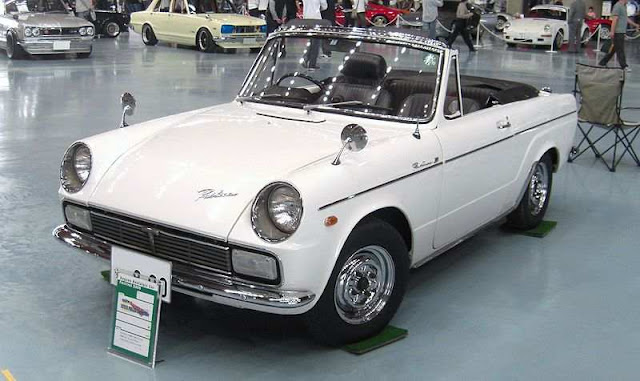 |
| Toyota Publica 1961-1978 |
Toyota Publica Specifications :
Manufacturer :Toyota
Production : 1961-1978
Body style(s) 2-door sedan, 2-door station wagon, 2-door coupé, 2-door convertible, 2-door pickup truck
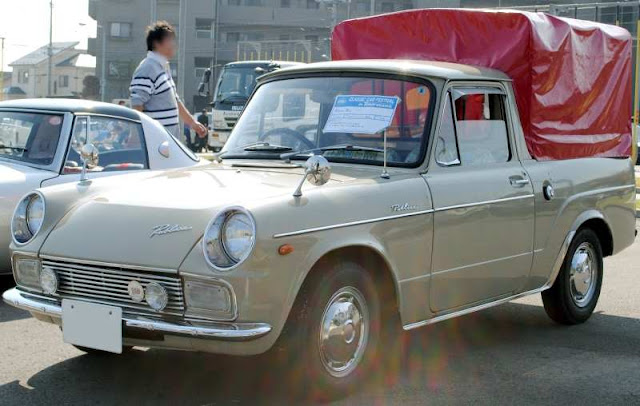 |
| Toyota Publica 1961-1978 |
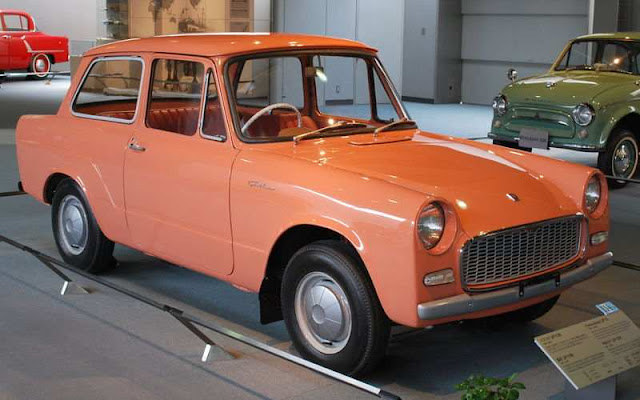 |
| Toyota Publica 1961-1978 |
Photo Credit : Mytho88, TTTNIS, Ypy31
 Manufacturer : Volkswagen
Manufacturer : Volkswagen
 Productions : 1961
Productions : 1961
 Engine : 1.5 L engine (1500 N, 45 hp or 1500S, 54 hp)
Engine : 1.5 L engine (1500 N, 45 hp or 1500S, 54 hp)
 Source : netcarshow.com
Source : netcarshow.com
The Volkswagen Type 3, was originally launched in two varieties, the Notchback a saloon bodied version and the Squareback an estate bodied version in 1961. The Fastback a coupe styled version arrived as the 1966 addition to the range. This automobile was introduced in 1961 by Volkswagen to diversify its product range beyond the Type 1 (Beetle) and the Type 2 (Bus). The Type 3, officially the Volkswagen 1500, was designed to allow Volkswagen to make a more sophisticated car while maintaining much of the engineering from the Type 1.
The Type 3 was initially equipped with a 1.5 L (1493 cc) engine based on the aircooled flat-4 found in the Type 1. While the long block remained the same as the Type 1, the engine cooling was drastically changed to allow for a much lower engine profile. This resulted in increased area for cargo stowage and the so-called ‘Pancake’ or ‘Suitcase’ engine. This engine’s displacement would later increase to 1600cc.
Originally a single or dual carbureted 1.5 L engine, (1500 N, 45 hp or 1500S, 54 hp) the Type 3 engine got a larger displacement (1.6l 1600 cc) and modified in 1968 to include fuel injection as an option, making it one of the first mass production consumer cars with such a feature (the first was the Type 4 VW 411).
 Manufacturer : Renault
Manufacturer : Renault
 Productions : 1946-1961
Productions : 1946-1961
 Source : netcarshow.com
Source : netcarshow.com
The Renault 4CV was an automobile produced by the French manufacturer Renault from 1946 to 1961. An economical “people’s car” inspired by the Volkswagen Beetle, it was the first French car to sell over a million.
The 4CV was originally conceived and designed covertly by Renault engineers during the German occupation of France during World War II, when the manufacturer was under strict orders to design and produce only commercial and military vehicles. A design team led by Fernand Picard, Charles-Edmond Serre and Jean-Auguste Riolfo envisioned a small, economical car (similar to the Volkswagen Beetle) suitable for the economically difficult years which would inevitably follow the war. The first prototype was completed in 1942 and two more prototypes were produced in the following three years, with the 4CV ultimately presented to the public and media at the 1946 Paris Motor Show.
On the 4CV’s launch, it was nicknamed “La motte de beurre” (the lump of butter) due to the combination of its shape and the fact that many early models were painted with sand yellow-colored German army surplus paint intended for the Afrika Korps. The 4CV was powered by a 748 cc engine producing 17 hp, which was coupled to a three-speed manual transmission. Despite an initial period of uncertainty and poor sales due to the ravaged state of the French economy, the 4CV had sold 37,000 units by mid-1949 and was the most popular car in France. The car remained in production for more than a decade afterwards; it was intended to be replaced by the Renault Dauphine, launched in 1956, but the 4CV in fact remained in production until 1961, only a year earlier than the more expensive Dauphine was discontinued. In event, it was replaced by the Renault 4 which used the same engine and name as the 4CV and sold for a similar price.
Tags 1946-1961, 4 CV, Renault |
August 26, 2010 – 8:41 am
Volkswagen Super Beetle Type 1 (VW 1303) 1973
Volkswagen Super Beetle Type 1 (VW 1303) 1973 Specifications :
Manufacturer : Volkswagen
Productions : 1973
Engine : 1500 cc OHV H4, bore 83 mm, stroke 69 mm, Transmission : 4-speed manual
Wheelbase : 2,400 mm (94.5 in)
Length : 4,079 mm (160.6 in)
Width : 1,539 mm (60.6 in)
Curb weight : 840 kg (1,900 lb)
Photo Credit : Ed McGowan
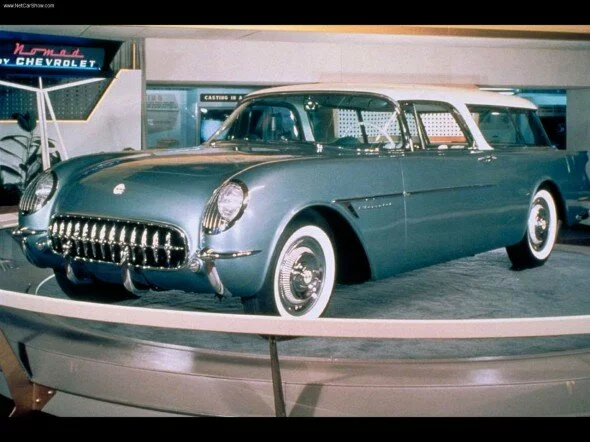
 Manufacturer : Chevrolet
Manufacturer : Chevrolet
 Productions : 1955-1961
Productions : 1955-1961
 Source : netcarshow.com
Source : netcarshow.com
The Chevrolet Nomad was a station wagon produced by the Chevrolet Motor Division of the General Motors Corporation from 1955 to 1961. The Nomad is best remembered as a two-door station wagon and is commonly associated with the “surf culture” of the late 1950s and early 1960s. The Nomad was considered Chevrolet’s halo model during its three-year production as a two-door station wagon.
read more »
Oldsmobile Cutlass (1961)
 Manufacturer : Oldsmobile
Manufacturer : Oldsmobile
 Productions : 1961
Productions : 1961
 Engine : V8 engine 155 hp (115.6 kW) and 210 lb-ft (284 N-m)
Engine : V8 engine 155 hp (115.6 kW) and 210 lb-ft (284 N-m)
 Source : netcarshow.com
Source : netcarshow.com
The Oldsmobile Cutlass was an automobile made by the Oldsmobile division of General Motors. The Cutlass was introduced in 1961 as a unibody compact car competing with the Dodge Lancer and Mercury Comet.
Over the years, the Cutlass name was used by Oldsmobile as almost a sub-marque, with a number of different vehicles bearing the name simultaneously. This was probably shrewd, because the Cutlass name had great equity and became one of the most popular nameplates in the industry in the 1970s. However, the proliferation of Oldsmobile Cutlass models caused confusion in the market-place in the 1980s, when three different vehicles (the Cutlass Calais, Cutlass Ciera, and Cutlass Supreme) all shared the name.
October 15, 2010 – 6:06 am
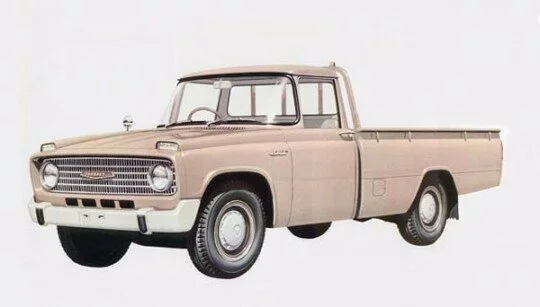
Toyota Stout 1961
Toyota Stout specification :
Manufacturer : Toyota
Production : Start April 1954
Engine : 1500 cc Type R
Transmission : Manual
Body : 2-door, 3 seater pickup with a separate well body (with a fold down tailgate). Other bodies advertised by Toyota included a van, an ambulance, double cab coupe utility (2-doors, 6 seater, integral well body), drop-side pickup, pickup with stake sides, a pickup with full height metal side with a canvas top, a light bus (precursor to the Coaster) and an ice cream van.
Suspension : leaf springs.
Brakes : 4 wheel drum brakes.
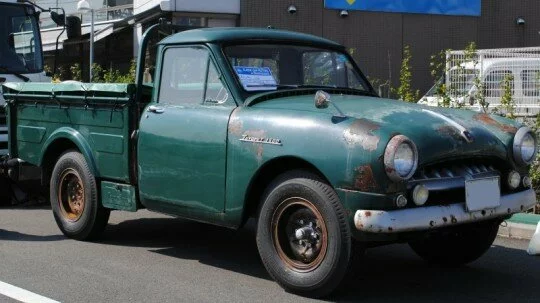
Toyopet Stout First Generation (RK)
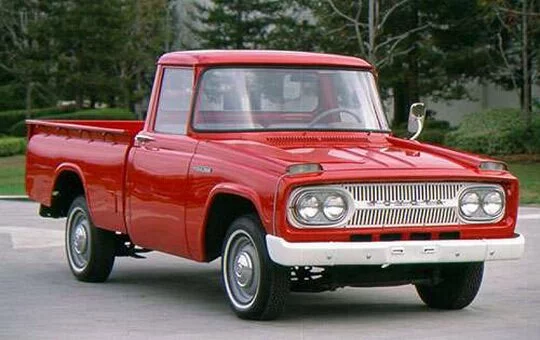
Toyota Stout 1967
Photo Credit : Ypy31
 Manufacturer : Volkswagen
Manufacturer : Volkswagen
 Productions : 1977-1979
Productions : 1977-1979
 Engine : 50 PS (37 kW) 1043 cc
Engine : 50 PS (37 kW) 1043 cc
 Source : netcarshow.com
Source : netcarshow.com
The Mk I Polo, a rebadged version of the Audi 50, was introduced in 1975. The differences between the Audi and VW models were minor, with the Polo being cheaper and much more basic. The two cars were initially sold along side each other, but the Audi 50 never sold as well, and was withdrawn in 1978. The Polo was manufactured at the Volkswagen plant in Wolfsburg. In 1977, the Derby sedan was released, which was simply a Polo, identical to the hatchback from the C-pillar forward, with a large boot attached (an old Audi proposal, but never sold by this brand).
When first on sale the range topping car, the LS model, featured the 50 PS (37 kW) 1043 cc engine found in the Audi 50. Other specifications included parking lights, rear wash wipe, sun visors, chromed bumpers and 4.5J X 13″ wheels. The N model was the basic starting spec lacking many of the features of the LS. In 1979 the GLS was introduced, replacing the LS as the range-topping car; specification upgrades included chrome headlight and grill surrounds, sunroof, a cigarette lighter and chrome wheel trims.
895 cc, 1093 cc and 1272 cc engines were used, with the smaller one used only in the Polo hatchback, and the 1272 cc only in the Derby, Audi 50, and the rare Polo GT. Different levels of compression were used on each size to achieve different power outputs, and the variations are numerous, often differing depending on the country of sale, ranging from 35 to 60 PS (26 to 44 kW).
 Manufacturer : Saab
Manufacturer : Saab
 Productions : 1960
Productions : 1960
 Engine : 841 cc three-cylinder two-stroke engine
Engine : 841 cc three-cylinder two-stroke engine
 Transmission : Four-speed manual transmission
Transmission : Four-speed manual transmission
 Source : netcarshow.com
Source : netcarshow.com
The Saab 95 was a 7-seater, 2-door station wagon made by Saab, based on the Saab 96 sedan version. It was introduced in 1959, but because only 40 were made in 1959, production is often said to have started in 1960.
The first engine was an 841 cc three-cylinder two-stroke engine, but from 1967 onward, it became available with the same four-stroke Ford V4 as used in the Saab 96 and the Ford Taunus. It had a four-speed manual transmission. A rear-facing folding seat was dropped with the 1976 model, making the car a regular 5-seater. Production ended in 1978. A total of 110,527 were made.
For certain markets (Norway, Denmark) a special export version delivery van was available without a rear seat and rear side windows. Both commercial companies and private persons made conversions of the Saab 95 to a pickup truck.
In 1961, Erik Carlsson finished 4th in the Monte Carlo Rally in a two-stroke Saab 95.
read more »
January 24, 2011 – 3:16 pm


















